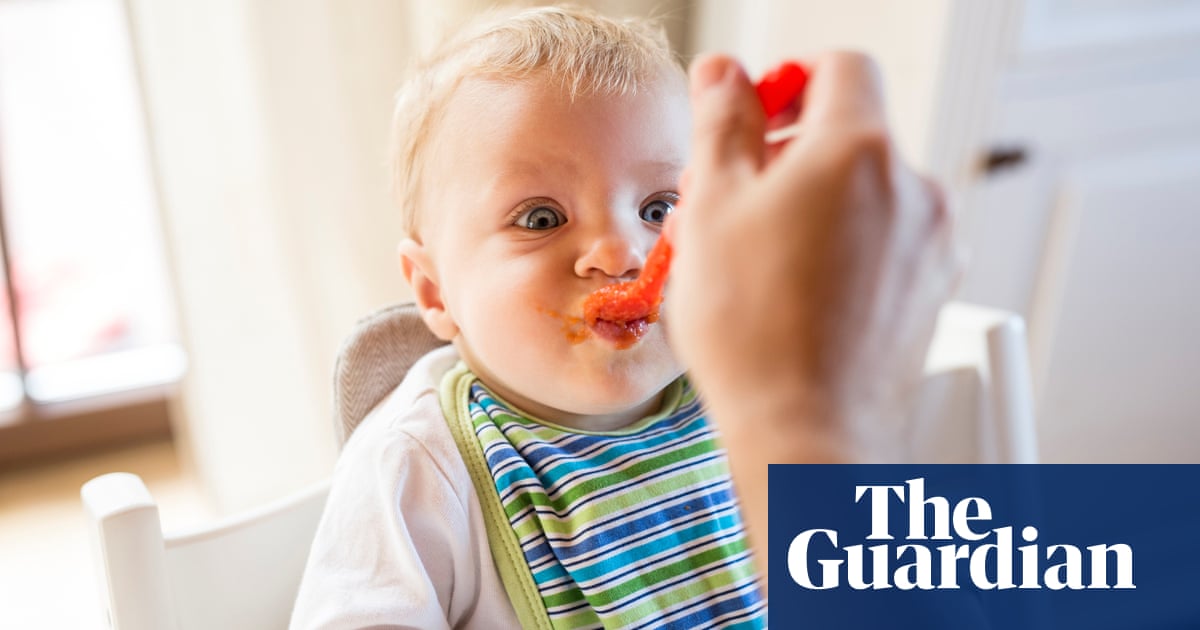Top brands such as Ella’s Kitchen and Heinz are making sugar-heavy, nutritionally poor baby food that fails to meet the needs of infants, a study has found.
The discovery has spurred groups to call for ministers to strengthen regulation in the market, saying that the current state of affairs will negatively affect child growth and development.
Researchers at the University of Leeds School of Food Science andNutritionfound that some brands also carried misleading marketing claims, leading them to urge the government to “act now” in imposing the same traffic light system found on chocolate bars and ice-cream.
Ella’s Kitchen pear and peach baby rice was found to have a rice content of only 3%, while sugar made up 60% of its calories.
Heinz fruity banana custard gets 71% of its total calories from sugar, with its ingredients only containing 4% milk powder, while its baby oat porridge is 29% sugar.
The study, funded by the Which? Fund, looked at 632 food products marketed towards babies and toddlers under three.
It found that 41% of main meals marketed for children had sugar levels that were too high and that 21% of ready-to-eat fruit products, cereals and meals were too watery and not providing adequate nutrition.
It also discovered that many early weaning foods were being sold as being suitable for babies aged four months, which goes against NHS and World Health Organization guidance.
The study also found that a quarter of the products analysed were so high in sugar they would require a sugar warning label on the front of the pack, in accordance with WHO guidelines. According to NHS guidelines, babies aged one should have no more than 10g of sugar per day, and no more than 14g per day for children aged two and three.
The sugar recommendation is applicable to naturally occurring free sugars and added sugars.
The report also surveyed more than 1,000 parents. It found that 70% of parents agreed that high sugar baby foods should have front-of-pack warning labels, while 59% were concerned about the high levels of naturally occurring sugars in food.
Dr Diane Threapleton, the lead author of the study, said: “Voluntary guidelines are often ineffective, and so regulation is needed to make sure that change happens.
“With around 1.7 million children between six and 36 months in the UK, baby food is a massive market. Widespread availability of inappropriate products with poor nutritional quality will negatively impact child growth and development.”
Sign up toFirst Edition
Our morning email breaks down the key stories of the day, telling you what’s happening and why it matters
after newsletter promotion
Dr Vicky Sibson, the director of First Steps Nutrition Trust, said: “As a result of pervasive misleading marketing, parents are unwittingly buying products that are simply not good enough nutritionally. Stronger, mandatory baby food regulations are long overdue.”
Sue Davies, the head of food policy at Which?, said: “The government urgently needs to update the out-of-date laws for commercial baby foods to ensure there are tighter controls on their composition – including limits on their sugar and salt content – make labelling clear and upfront and clamp down on any misleading marketing claims that suggest products are healthier than they really are.”
A spokesperson for Ella’s Kitchen said: “There is nothing misleading about the name of this product. It follows strict legislation on how foods must be named, and clearly reflects exactly what is in the pouch – pears, peach and baby rice – in order of quantity.
“Our ‘no added sugar’ claim is legally approved – and absolutely accurate. We never add sugar to our weaning products; all the sweetness comes naturally from the fruit and veg we use to make them.”
A spokesman for Kraft Heinz said: “We’re proud of the role we play in families’ lives and remain committed to the health and wellbeing of infants and young children. We provide quality products based on nutrition science that meet the nutrient requirements specific to this life stage and adhere to stringent UK/EU regulation.
“Our convenient, resealable pouches, made from natural ingredients with no added sugars, should be used as a complementary part of a varied weaning diet (six+ months) and are designed to be squeezed into a bowl or straight on to a spoon – as communicated on pack.”
A Department of Health and Social Care spokesperson said:“Existing laws already set nutrition needs for baby foods, and we support enforcement against any product that does not meet these expectations.”
